
IPMAT 2019 Question Paper With Detailed PDF Solutions
Get the complete IPMAT 2019 paper with answers and explanations
Download IPMAT Question Paper PDF
Get the complete IPMAT 2019 paper with answers and explanations
Download IPMAT Question Paper PDF13

3
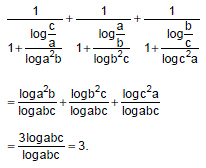
19
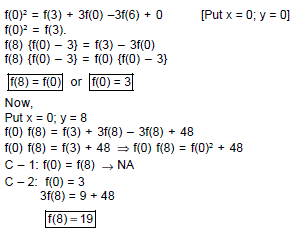
10

1

30
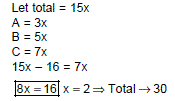
10

9
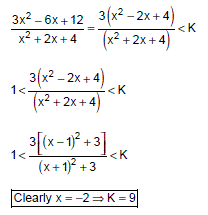
6
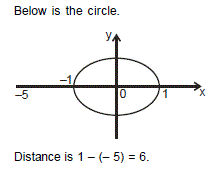
16
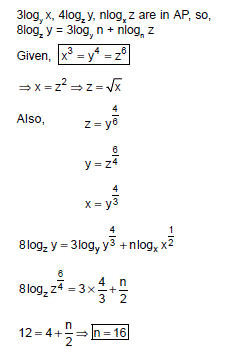
4
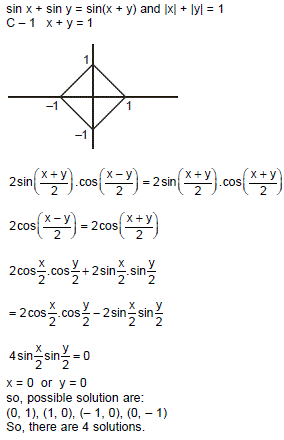
38
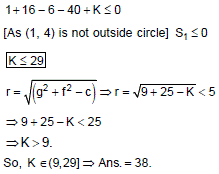
4

9
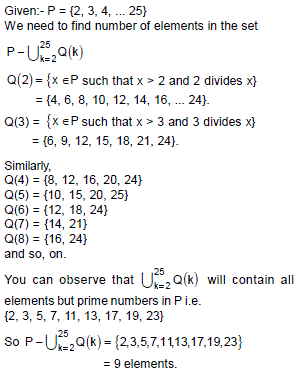
12
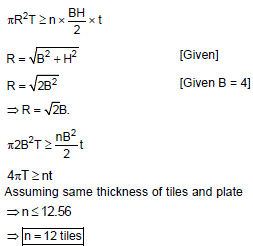
29
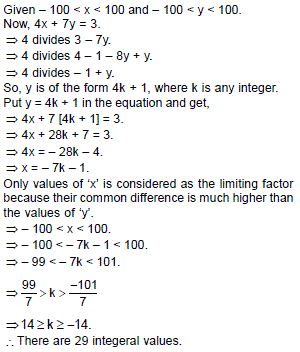
144

4
9 terms = 1 to 9 (each of 1 digit)
90 terms = 10 to 99 (each of two digits)
900 terms = 100 to 999 (each of three digits)
........so on......
9+90*2+900*3 = 9+180+2700 = 2889 which is less than 6389
so there would be a 4 digit number which would contain 6389th term.
6389-2889 = 3500 = total remaining digits.
Since each number is of 4 digits so 3500/4=875
Starting from 1000 to 1874 (total 875 terms)
and so our answer will be 4.
2
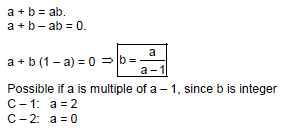
388
N < 1000, so N can have values from 1 to 999.
Now Multiples of 4 are {4, 8, 12…,996}, count of this N4 = (996–4)/4+1=249
Now Multiples of 6 are {6,12,18,...996}, count of this is N6 = (996–6)/6+1=166
N4 and N6 are having common which are multiple of LCM of 4 and 6 or 12
That is., {12,24,…..996}, count of this N12 = (996–12)/12+1 = 83
Now the odd multiples of 9 are {9,27,45,…..,999}
So, N9 = (999–9)/18+1 = 56
Thus, total of the required numbers = N4 + N6 - N12 + N9 = 249+166–83+56 = 388
a
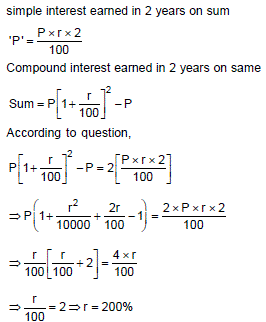
c
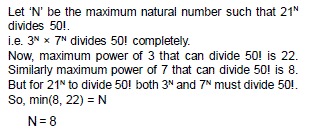
c
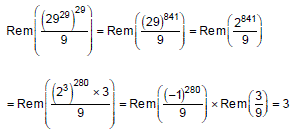
a
let the six digit number be 4530xy.
For the number to be divisible by 6, it has to be divisible
by both 2 and 3.
Now, for this to be divisible by 3, sum of digits must be
divisible by 3.
i.e. 4 + 5 + 3 + 0 + x + y = 12 + x + y is divisible by 3.
Looking at the given options, all are divisible by 3 and
as they are even so also divisible by 2.
So, all four given options make it divisible by 6 and
similarly all are divisible by 9 except 54.
Now, out of the remaining three options only 96 in
place of ‘xy’ gets divided by 7.
So, the number must be 453096.
a
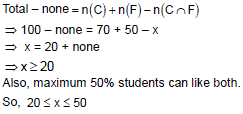
a
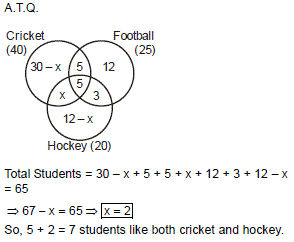
d
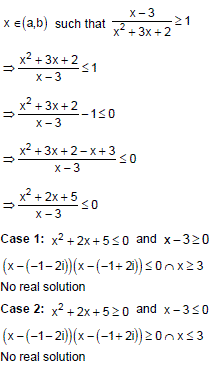
d
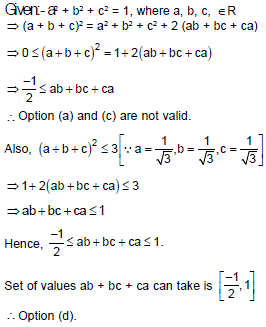
a

d
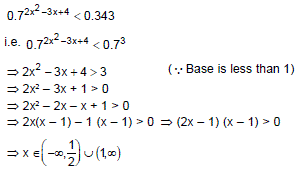
d
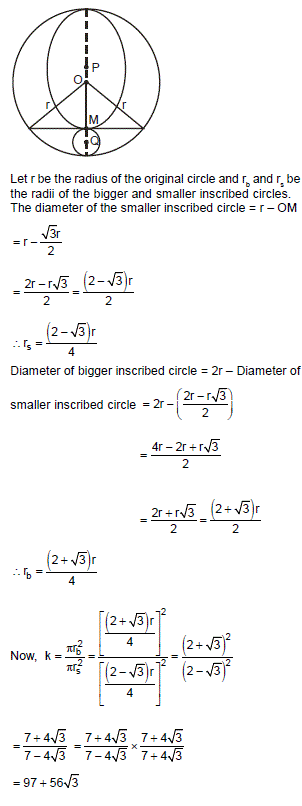
c
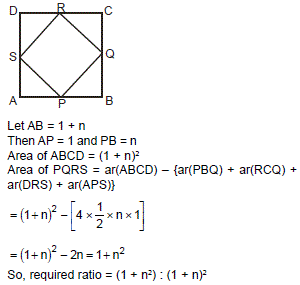
a
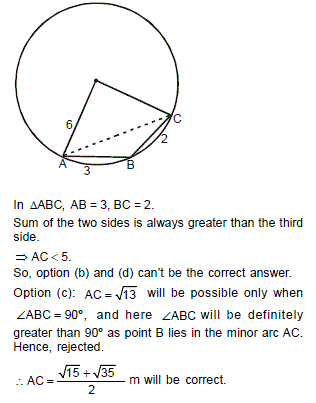
a
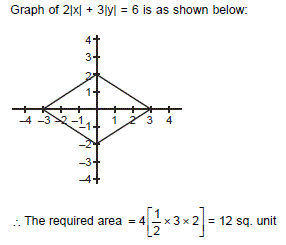
d
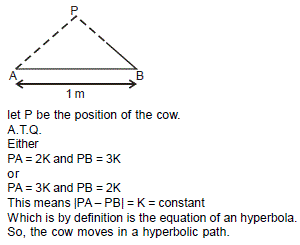
a
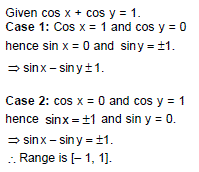
d
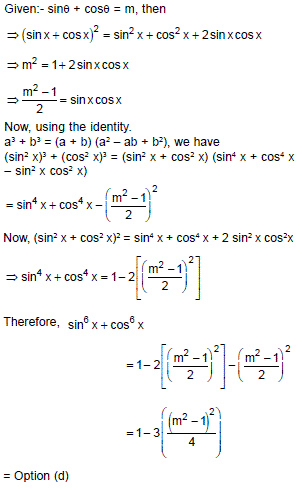
a

c
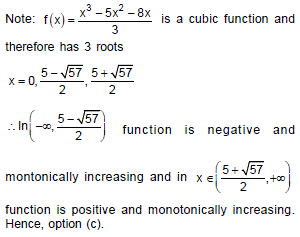
d
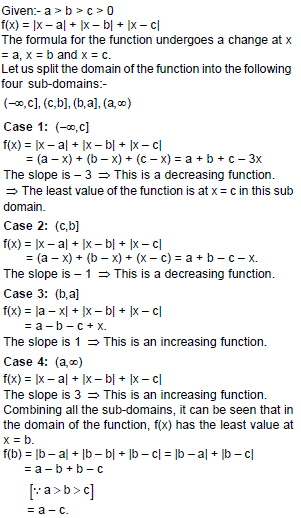
a
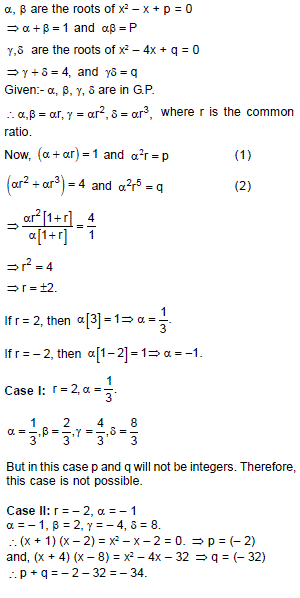
a
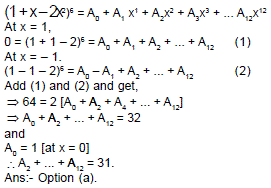
a
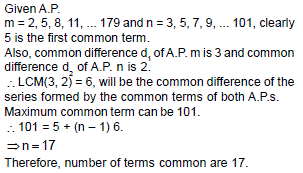
b
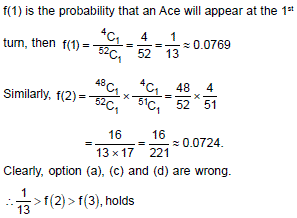
c
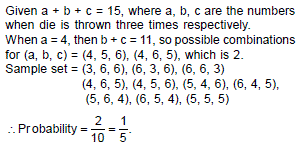
b
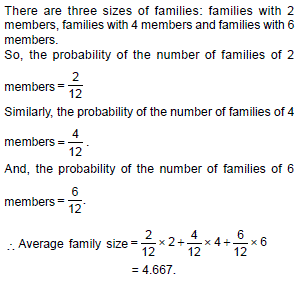
d
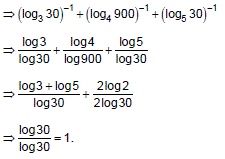
a
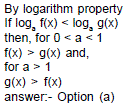
a
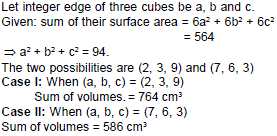
b
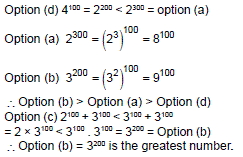
a
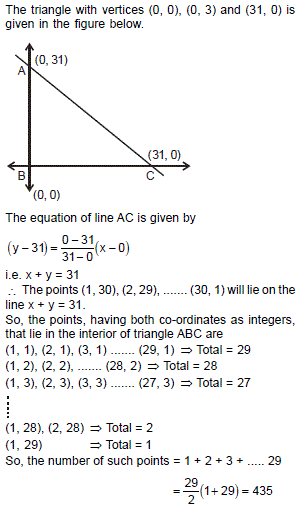
c
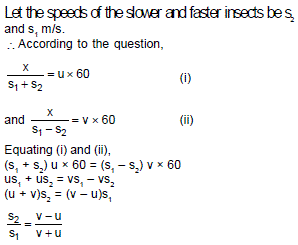
c
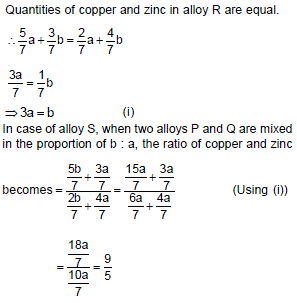
c
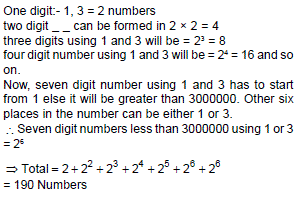
c
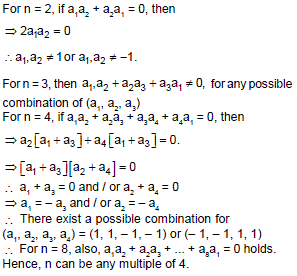
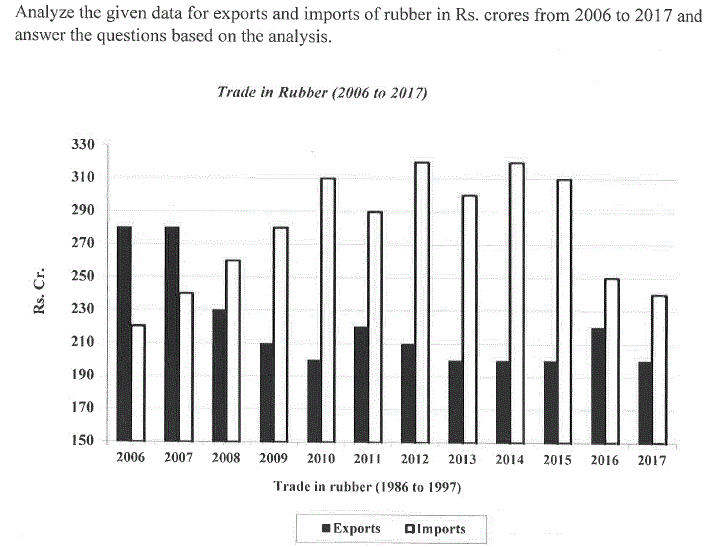
b
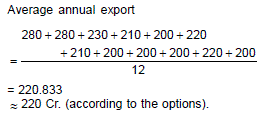
a
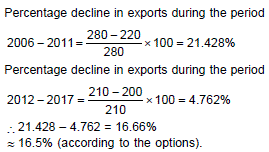
c
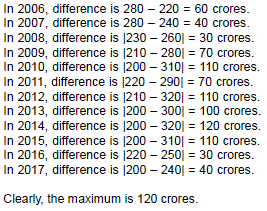
d
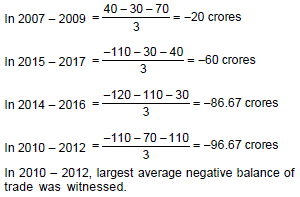
a
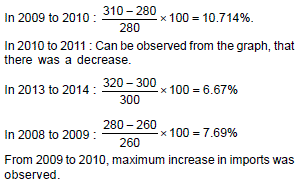

d
Option d is correct as it takes specific skills to look for rocks, which are suited for an educated man.
c
Option c is the correct answer as the author uses the word just to describe the suspicion behind secret acts. Thus according to the author it is natural to associate secrecy with suspicion.
b
Option b is correct as the question only lists the selfish acts of the shoemaker without referring to the offer that he is making.
d
Option d is correct as the author argues throughout the length of the passage, that cooperation is imperative for survival in such kind of an environment.
b
Option b is correct as the author predominantly favours the need for a team to cooperate among themselves. Option (a) is incorrect as it is merely a convenient situation that may not be always practically possible. Options (c) and (d) are incorrect as they fall within the purview of cooperation themselves.
a
Option a is correct as all details mentioned by the author could be related to human societies in general, as the author is describing elements of human nature and behaviour, which is primarily same and can be generalised irrespective of their surroundings.
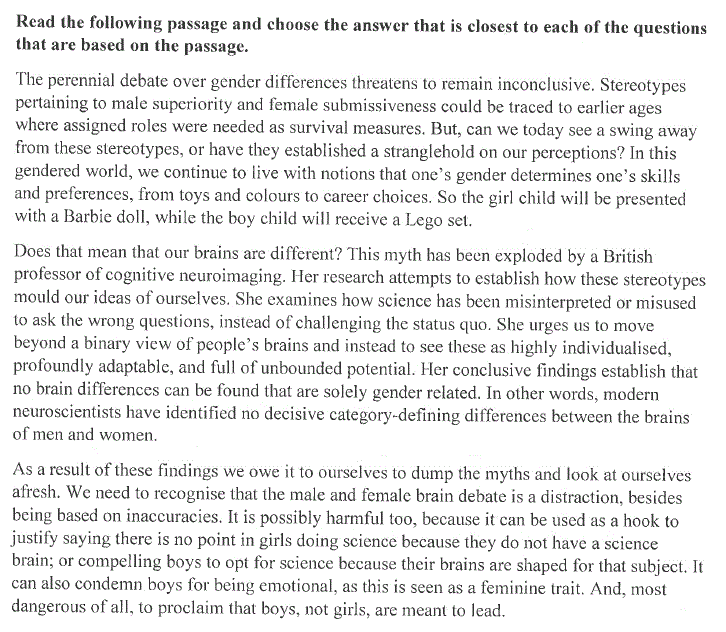
c
Option c is correct as the British professor’s study is concerned with the social impact of gender stereotypes, and thus the need to shun them away is being stressed by the study.
b
Option (b) is correct as the word “gendered” has been paired with “world” to describe a world than is deeply immersed in gender stereotypes. The word gendered is pointing to the sheer extent of the stereotypes.
a
Option a is correct as the binary view of human brain is based on categorizing it in two inhibiting categories of feminine and masculine, which distorts the idea of individualism of the human brain.
a
Option a is correct as the passage employs the scientific study to explain about gender related issues of the human brain.
d
Option d is correct as the word stranglehold is being used to convey the control that stereotypes have established over our perception. The act of establishment can only be related to control from the given choices.
c
Option c is correct as in the context of the passage, the word unbound is conveying the meaning of freedom and uncontained, the opposite of which would be restricted.

a
Looking at the flow of the ideas, we can see that the speaker is essentially asking that the person be kept away from snacks. Hence, a is the answer.
d
The phrase “hang in there” means to stay in a situation often in unsuitable circumstances.
d
Option d is correct as pass muster means be accepted as adequate or satisfactory.
b
Option b is correct. If you scrape together an amount of money or a number of things, you succeed in obtaining it with difficulty. .
d
Option d is correct as “play it by the ear” is an expression which means to act spontaneously and according to the situation.
d
Option d is correct as to slip someone’s fingers means that something evaded after being very close to be achieved.

c
The question tags are redundant as the keywords like “place “and “reason” are conveying the desired meaning quite effectively.
d
Option d is correct as which must not be followed by one team and as there is a comparison, the word better is more appropriate.
a
Option (a) is the correct answer as ‘whom’ is the correct term to use and ‘had’ is the correct tense.
a
Option (a) is the correct answer as ‘apologize’ is the correct form of tense along with the use of the verb ‘did’.
b
Option (b) is the correct answer as ‘their’ is the correct number and ‘off’ is the correct preposition.
c
Option (c) is the correct answer as ‘offered’ is the correct tense and ‘by is the correct preposition.

a
Option (a) is the correct answer, since the statement that the climate is not the only cause for flooding is furthered in the passage by providing infrastructure as an alternative.
a
Option (a) is the correct answer as it furthers the idea of acceptance of growing old by inculcating elements of fun and humor in life.
b
Option (d) looks correct but is negated since it talks about armed rebellion and uprisings which is not what the sentence talks about. Option (b) is the correct answer since the sentence is essentially listing the various reasons for the uprising and this continues the description.

b
Option (b) is the correct answer as the term assiduous refers to a diligent person which fits in with context of the passage. Querulous refers to a fussy or difficult person while whining refers to the act of complaining which together complete the idea of the passage.
d
Option (d) is the correct answer as the sentence contrasts the fundamentals of multiculturalism and tribalism. Thus, 'opposite' fits in the first blank making (d) the correct answer.
b
Option (b) is the correct answer as ‘motifs’ refer to decorative image or design, especially a repeated one forming a pattern which fits in the context of the passage.
d
Option (d) is the correct answer as the term ‘guide’ is used to refer a supporting document while ‘precis’ refers to a summary of a larger document which fits in with the context of the passage.
c
Option (c) is the correct answer as the terms ‘entering’ and ‘shaping’ fits in with the context of the passage and completes its idea.
c
Option (c) is the correct answer as the use of the word ‘critic’ has been used improperly.'Critique' which refers to a detailed analysis and assessment of something, especially a literary, philosophical, or political theory should be used here.
b
Option (b) is the correct answer as the term ‘teamed in’ has been used incorrectly with the context of the sentence.
b
Option (b) is the correct answer as the word ‘write’ has been used instead of using the word ‘right’.
a
Option (a) is the correct answer as ‘raise’ has been used as an improper verb in the context of the passage. The correct verb is 'raze' which means to burn.
a
Option (a) is the correct answer as Shakespeare is called 'the bard', not 'a bard'. The word 'bard' means poet. Shakespeare is called 'The Bard' because he is widely recognized as the greatest poet the world has ever known.

2143
2143 is the correct sequence as 21 forms a pair as the pronoun ‘he’ used in 1 is for the noun ‘hunter-gatherer’ referred to in 2. 3 is the concluding sentence as it provides finality to the idea of the passage.
3241
3241 is the correct sequence 32 forms a pair with the contrasting conjunction ‘however’ joining sentence 3 and 2. 1 is the concluding sentence as it provides finality to the idea of the passage.
25413
25413 is correct as 541 forms a sequence which can easily be ascertained on the basis of the mention of 'a study' and 'the study'. 2 has to come at the beginning of the sequence while 3 has to go at the end as it provides finality to the idea of the passage.